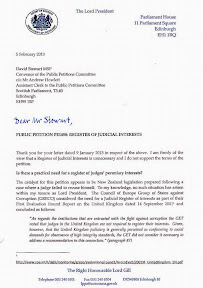Law Society of Scotland to review its own dodgy claims fund. THE Law Society of Scotland has announced a ‘root & branch review’ of the infamously corrupt Scottish Solicitors Guarantee Fund, a fund paid into by all members of the legal profession. The Guarantee Fund, which the society claims will be ‘independently’ reviewed, differs from the equally corrupt Master Policy in that the former pays out for victims of dishonest solicitors, while the latter is supposed to pay out for victims of negligent solicitors.
The Law Society claimed in an announcement its latest “wide ranging and independent review of the compensation fund”, to be carried out independently following an open tender process. will study the purpose of the Guarantee Fund along with the cover and benefits it provides to consumers. It will also consider the funding and governance arrangements and how these fit with the rapidly changing legal marketplace. The review is expected to be completed over the next 12 months with a report and recommendations made to the Society's regulatory committee.
Diary of Injustice has previously reported on how victims of crooked lawyers are poorly treated by the Scottish Solicitors Guarantee Fund, which has a poor track record at honouring its claim to compensate victims of corrupt solicitors : Law Society's 'Guarantee Fund' for clients of crooked lawyers revealed as multi million pound masterpiece of claims dodging corruption
However, in an attempt to counter previous and well publicised evidence against the Guarantee Fund’s integrity, Carole Ford, the non-solicitor convener of the Society's regulatory committee claimed in a statement issued by the Law Society : "By setting high standards for solicitors and regularly inspecting firms, our first responsibility is to try and prevent problems from arising in the first place. However, we also need a robust scheme that protects innocent clients when things do go wrong, particularly when clients lose money through no fault of their own and as a result of a solicitor's dishonesty.”
Ms Ford continued : "For over 60 years, the Guarantee Fund has been a cornerstone of the Scottish solicitor profession, giving assurance to consumers and being funded entirely by solicitors without the use of taxpayers' money. Maintaining the Fund and considering applications for payments from affected clients are just some of the many ways in which the Law Society works to protect the public interest. However, we know the legal market is changing and changing rapidly. That is why now is the right time to have a root and branch review of the Fund and consider whether the arrangements put in place by legislation are still effective and appropriate for today."
Commenting on Ms Ford’s claims, a legal insider retorted :”Well, now you know why financial claims against crooked lawyers have failed for the past sixty years – because lawyers and the Law Society of Scotland have been looking after their own and covering their own backs.”
The latest review of the Guarantee Fund, which has been mired in fraud, controversy and allegations of discrimination against clients who were placed in the unenviable position of having to claim for compensation against their dishonest solicitor, comes after various earlier reports from the powerless Scottish Legal Complaints Commission (SLCC) found the fund lacking in its claims & provisions to pay out when the situation of almost financially ruined clients clearly merited compensation.
Over two years ago in September 2011, Diary of Injustice reported on the SLCC’s last attempt at a report into the Guarantee Fund, here : DISASTER REPORT : Scottish Legal Complaints Commission study of Law Society “Guarantee Fund” suffers 13% turnout, finds clients ‘treated as criminals’
The floundering attempt by Scotland’s ‘independent’, lawyer dominated SLCC to produce a report into the Guarantee Fund was hit by a poor response rate, partly due to the bungled arrangements put in place by the SLCC to research problems of the Guarantee Fund, and arguments between the regulator, the Law Society of Scotland and other lawyers lobby groups.
 Report heard Law Society staff made Guarantee Fund claimants feel like criminals. The SLCC's Report carried out by the SLCC into the Scottish Solicitors Guarantee Fund heard from clients they were made to feel criminals by the Law Society of Scotland staff who controlled the compensation scheme. The SLCC survey was also hit by problems over the arrangements for distribution of the questionnaires, where almost unbelievably, the SLCC were forced to rely on the Law Society of Scotland to distribute the forms themselves, after refusing to hand over the identities of claimants to the Scottish Legal Complaints Commission.
Report heard Law Society staff made Guarantee Fund claimants feel like criminals. The SLCC's Report carried out by the SLCC into the Scottish Solicitors Guarantee Fund heard from clients they were made to feel criminals by the Law Society of Scotland staff who controlled the compensation scheme. The SLCC survey was also hit by problems over the arrangements for distribution of the questionnaires, where almost unbelievably, the SLCC were forced to rely on the Law Society of Scotland to distribute the forms themselves, after refusing to hand over the identities of claimants to the Scottish Legal Complaints Commission.
One respondent to the survey stated : “It seemed as if the Scottish Solicitor’s Guarantee Fund were trying to pay as little as possible and were looking after their own interests. Again you were made to feel like a criminal at the hearing.”
Another respondent said : “I was not fully compensated for a fraud that was not my fault but my solicitor's, who was now in jail and yet I had to suffer financially and with stress.”
Comments from the five people who provided reasons for their satisfaction expressed relief that the process had come to an end and they perceived that the Fund had worked well for them.
One respondent said : “Achieved desired outcome although would have preferred not to have gone through the process at all.”Another respondent said : “[Because] I felt that I could move forward and bring closure to the whole affair [as] I had felt very let down by the solicitor involved in my particular case.”
Diary of Injustice featured a report on the SLCC’s Guarantee Fund research project as it took shape, HERE and upon publication of the SLCC’s report, carried out by Progressive, a research company based in Edinburgh, final figures revealed an abysmally low response rate of only 13%, where the research company contracted by the SLCC ultimately received only 19 replies out of 145 questionnaires sent out by the Law Society of Scotland.
The research firm conducting the survey on behalf of the SLCC said in their report : “Progressive was not able to receive a database of contact details from the Law Society of Scotland. As such the questionnaire packs were sent to LSS for labelling and distribution.”
The company were further critical of the Law Society’s methods of distribution, stating “A large proportion of questionnaires were not sent directly to claimants. Sending questionnaires first to solicitors to pass on to their clients would have affected the likelihood of the questionnaires reaching them and also their likelihood of completing them.” Progressive further warned : “This is likely to impact response rates.”
The report also claims : “Missing information on labels. A few solicitors fed back that there was no client contact on the packs they were sent so were unable to forward these on, again, affecting the final response rate (at least 4 reported this to be the case)” and that some clients who were sent questionnaires by the Law Society of Scotland could not be traced because they had moved address.
CONDUCT OF REGULATOR PREJUDICED CONSUMER CLAIMS
Former SLCC Board Member Margaret Scanlan branded Guarantee Fund claimants as “chancers”. Previous investigations in to the SLCC’s attitude towards clients and compensations claims against solicitors have revealed prejudice against consumers at the very heart of the SLCC itself, which spilled out into the media when now former SLCC Board Member Margaret Scanlan raged against claimants to the Guarantee Fund, branding them “chancers” in a series of bitter emails revealed through a Freedom of Information investigation here : HERE& HERE
Continuing investigations into the SLCC by Diary of Injustice further revealed another board member, David Smith , married to Court of Session judge Lady Smith, had described claimants to the Master Policy, the Law Society of Scotland’s equally corrupt Personal Indemnity Insurance coverage for negligent solicitors, as “frequent flyers”.
The SLCC had attempted to withhold the identity of the board member who made the anti-client remarks, however, the regulator was ordered to release the information by a decision of the Scottish Information Commissioner. Diary of Injustice reported on the move by the then Information Commissioner, Kevin Dunion (who is now a board member of the SLCC), here : FOI Chief Dunion orders Scottish Legal Complaints Commission to release board member’s anti-client jibes, Master Policy study details
Two earlier reports published by Diary of Injustice featured findings of the University of Manchester 2009 report into the Guarantee Fund & Master Policy, here : 'Ground-breaking' investigation into Law Society's Master Policy insurance reveals realities of corrupt claims process against crooked lawyers and here : Suicides, illness, broken families and ruined clients reveal true cost of Law Society's Master Policy which 'allows solicitors to sleep at night'
If you have a claim against the Scottish Solicitors Guarantee Fund, or the Master Insurance Policy, tell us at Diary of Injustice at scottishlawreporters@gmail.com





